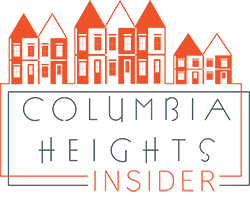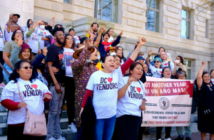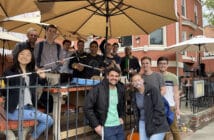“What do we live for, if it is not to make life less difficult for each other?”
George Eliot
Just over a month ago, we said goodbye to a calamitous year defined by protests, politics and a pandemic. It was a year that “will live in infamy,” to borrow FDR’s famous words. But what will this year bring? Your commissioners have some ideas and are hard at work engaging the community to bring about the change and eventual recovery needed.
Jump To: 1A01 Layla Bonnot | 1A02 Dieter Lehmann Morales | 1A03 Zach Rybarczyk | 1A05 Christine Miller | 1A07 Mukta Ghorpadey | 1A12 Jason Clock | 1B07 Max Ewart | 1B06 Judy Kay Floy
1A01 Layla Bonnot
Most pressing issue facing Columbia Heights in 2021: Public Safety
And no, she’s not just talking about crime statistics or the efforts to curtail them. Rather, ANC 1A’s Public Safety Committee, which Commissioner Layla Bonnot co-chairs, approaches the concept of public safety through a public health lens, she explained.
Over the past year, COVID-19 has quickly risen as the top threat to public safety. However, the District’s response, particularly the rollout of its vaccine distribution program, has been accused of being disorganized, slow and inequitable.
After extending vaccine eligibility to those over the age of 65 earlier this month, D.C. health has come under fire for allegedly distributing a disproportionate amount of vaccine doses in primarily white, wealthy neighborhoods. Majority Black and Hispanic communities have remained largely unvaccinated despite both groups being at a higher risk of dying from the virus.
According to Bonnot, the city has been prioritizing vaccine distribution in the zip code areas hardest hit by the virus, like her own. And while Ward 3, a predominantly white and wealthier area of the city, currently has the highest rate of residents 65+ who have received a first dose (24.6%), Ward 1 is not far behind (19.3%).
What she’s doing to help
With the recent addition of seniors over 65 to the list of those eligible for the vaccine, Bonnot has noticed a flaw in the system: information on the vaccine distribution method, as well as the appointment-booking feature, reside only on the District’s website. Meanwhile, Bonnot pointed out, many eligible seniors are not online.
“I have neighbors who don’t even know the vaccine is available,” Bonnot said. “And so, I’ve been asking the city for printed materials.”
In addition to hosting the monthly public safety committee meetings, she’s actively involved with mutual aid groups in the community. “We regularly work with neighbors in need to provide masks that other neighbors are sewing for each other, and wipes, and sanitizer, and water, and just basic supplies on an ongoing basis,” Bonnot explained.
What you can do to help?
Supporting mutual aid groups is her first recommendation. But a step back from that is just talking to your neighbors and seeing if there’s any small way you can help each other out during this time.
1A02 Dieter Lehmann Morales
Most pressing issue facing Columbia Heights in 2021: Spanish-speakers left out of coronavirus response
Columbia Heights has long been hailed as one of the most diverse areas in the District, with residents scattered across spectrums of age, race, and wealth. However, when COVID spread across the city its devastating impact on areas like Columbia Heights highlighted the depth of disparities and inequities experienced by different communities in the District.
And in a neighborhood where Spanish is the de-facto second language, the lack of translation services for COVID-19 resources has put non-English speakers in an even more vulnerable position. For newly elected Commissioner Dieter Lehmann Morales, the biggest issue facing his community this year is “the inability of the city government to provide suitable translation services for much needed COVID-19-related information and resources,” he says. “Our community is mostly minority, with a large chunk of that comprising of Latino migrants, so it is imperative that the city’s resources, meant to help and assist them in responding to the public health emergency, be made available to them in their native languages.”
What he’s doing to help?
In January, ANC 1A passed a resolution around language access in an effort to hold the mayor and city accountable for not printing – or posting online – COVID-19 resources in many residents’ primary language. Commissioners “are in the process of sending a detailed letter to the Mayor outlining these issues,” Morales said.
A Mexican immigrant and fluent Spanish-speaker himself, Morales is also offering up his services as translator to his community.
“I have also extended my services as a fluent Spanish speaker to my fellow commissioners in case they need any documents or resources urgently translated in order to be disseminated to their residents,” he said.
What you can do to help
Morales: “It sounds cliché but get involved. Come to ANC meetings, maybe even join one of our ANC’s committees. But being plugged in is half the battle as that is how you become aware of these issues in the community and can then work with others to correct these issues. The more pressure we can apply on the city, the faster we can get them to provide these urgently needed resources, which they are legally obligated to do.”
1A03 Zach Rybarczyk
Most pressing issue facing Columbia Heights in 2021: COVID, and the ripple effect it has on “nearly every aspect of life”
“Columbia Heights has been hit harder by the COVID-19 pandemic than most, if not all, neighborhoods in the District,” Commissioner Zach Rybarczyk said. “And we know that the impacts of the pandemic have weighed disproportionately on neighbors who may have the fewest resources to weather the ongoing storm.”
Many residents in Columbia Heights rely on the income they make working as frontline workers, first responders or in other industries that require them to work in person. For individuals and families already living on the edge, fear of contracting the virus often takes a back seat to their more immediate concerns of keeping food on the table or paying rent.
Even those who were living comfortably before the pandemic – good wages from stable jobs with the resources to grow savings – have seen their lives turned upside down. Though unemployment rates in the District dropped slightly in December, for many wards they’re still nearly twice as high as the previous year. As of Dec 2020, Ward 1 had an unemployment rate of 5.7%.
Safe transportation options, the use of public space and recreation, access to educational resources, and public safety are some aspects of life Rybarczyk pointed to as being even more important now, especially for those with the fewest resources; yet they’re also the public works that have been most impacted by the pandemic.
What he’s doing to help
“Our Commission is made up of devoted public servants who I know are trying to advocate for and connect residents with resources that are available to them but are often complicated to obtain or simply aren’t clearly or widely shared,” Rybarczyk said. To that end, advocating for resources to be translated into priority languages is another focus of the ANC.
But as the chair of ANC 1A’s Transportation Committee, Rybarczyk has been advocating against cuts to public transportation services during the pandemic, which he said would “disproportionately impact neighbors who have the fewest resources to get around.”
Even pedestrian transit is something he’s taken a special interest in, as the use of outdoor spaces and the preferred modes of transit have changed in response to COVID. Pedestrians are some of the vulnerable road users, according to Rybarczyk.
“[They] can’t be overlooked in the planning process, especially as walking the block is still one of the safer forms of physical exercise and ways of getting around during the pandemic,” he said.
What you can do to help
“Anyone wanting to learn more, get involved, and help out could simply reach out to their Commissioner,” Rybarczyk recommended. Commissioners “can in turn help connect them with one or more of the dozens upon dozens of local organizations and devoted volunteer networks imbedded in the community making sure our neighbors survive and thrive through this pandemic.”
1A05 Christine Miller
Most pressing issue facing Columbia Heights in 2021: The COVID response and eventual recovery
With a vaccine in sight, and for some already available, there appears to finally be a light at the end of the tunnel. But getting there hasn’t been easy and there’s still a way to go. Under the new Biden administration, the District has been promised a 15% increase in vaccine allotment, and last week pre-existing conditions was added to vaccine eligibility qualifications in the city. Yet case counts continue to surge and often those most at risk are without the resources to navigate the cumbersome systems and new developments.
“For now, it’s vital we keep residents safe and supporting them through the challenges, especially working to make sure we are getting services to those who are being disproportionately impacted and who have been historically underserved,” Commissioner Christine Miller said.
What she’s doing to help
The most important task is getting resources and services to those who need it most, and through her work with local organizations and coalitions, Miller is helping to do just that.
“I am continuing my role as Chair of ANC1A’s Education Committee and will continue to push the District to make sure they provide vital information to all residents, especially [for]our non-English and limited English proficient communities,” Miller said.
She’s also focused on ensuring vital programs community members depend on continue to be funded, and that the values and priorities of that community are reflected in this year’s budget.
What you can do to help
“There is a ton of work to be done and so many ways residents can be involved,” Miller said. Volunteering with community-based organizations is a great way to start. “I keep a list [of organizations]and am always happy to help connect folks with opportunities,” she offered.
She also encourages residents to speak up during the budget cycle to ensure the Council understands the priorities of the community and the budget reflects those values.
“Our committee will be working on these efforts as well so we can help residents navigate this process and get involved.”
1A07 Mukta Ghorpadey
Most pressing issue facing Columbia Heights in 2021: Jobs
Columbia Heights has been hit hard by the pandemic, not only in terms of case numbers but also in job losses. “We continue to have the highest rates of COVID cases and have definitely seen drops in employment amongst our neighbors,” said newly elected Commissioner Mukta Ghorpadey.
One particular concern of hers is for the young people entering the job market at such a difficult time. She explained, “I’m hoping to help young people get connected to employment resources.”
What she’s doing to help
Ghoroadey’s has spent years building relationships with job training programs across the city as part of her day job working with youth. Such programs, she explained, recruit, train and help to place individuals in jobs.
“I want to leverage these relationships with community-based organizations to help my constituents find jobs,” she said.
And in order to follow through on this, she’s collecting constituent emails for a newsletter that will begin February.
What you can do to help
If you’re in Ghoroadey’s SMD, keep an eye out for a post card with information on the listserv she’s creating. How you can help out and get involved is one of the priorities of her newsletter.
And of course, she always encourages neighbors to engage in ANC meetings. Not only is there a monthly general body meeting, but several committee meetings if you have a particular area of interest
1A12 Jason Clock
Most pressing issue facing Columbia Heights in 2021: Crime and the impact of COVID on jobs and housing
Violent crime has spiked across the country in the past year with an increase in homicides by more than 50% from the summer of 2019 to 2020. The District has not been spared from this rise in crime, seeing its own 18% spike in homicides compared to the previous year. This is of particular concern to Commissioner Jason Clock, who also sees the traditional methods of law enforcement as often escalating issues in his neighborhood rather than diffusing them.
Crime is often tied to other metrics of community health like job and housing security or wage levels. Clock said he worries about the pandemic’s impact on evictions, job losses and wage reductions in his community.
“I really am worried about the post COVID effects on renters,” he said.
Currently, there’s a nationwide moratorium on evictions, which President Biden recently extended through March of this year. Whether it will be extended again or left for states to decide is a concern for many who will likely be dealing with the economic consequences of the pandemic far beyond March.
What he’s doing to help
In his commitment to reducing violent crime in his community, Clock has been in contact with Councilmember Brianne Nadeau who he said is seeking more community violence interrupters in neighborhoods worst affected.
Clock also explained that he and his fellow commissioners work to support the mayor’s programs to provide rental assistance at this time, as well as engage with the Office of the Tenant Advocate and other organizations in the hopes of finding a solution to the prospect of a post-pandemic “flurry of evictions.”
What you can do to help
“Get involved,” Clock said. “Volunteer with after school programs. Come to ANC meetings. You can join a committee at anc1a.org to help with education and public safety to name a few. Don’t be silent…your neighbors are impacted by COVID even if you aren’t.”
1B07 Max Ewart
Most pressing issue facing Columbia Heights in 2021: Safety
The issue of safety manifests in many forms, from COVID to traffic and transportation, Commissioner Max Ewart explained.
When it comes to the District’s COVID responses, particularly the vaccine rollout, he has seen how it has disproportionately benefited “high income residents who have computer access.” Yet many residents in Columbia Heights do not fall in this category. The equitable distribution of the vaccine is essential to the health of his community.
“Traffic related deaths, and less-lethal collisions, are largely viewed as an occupational hazard,” Ewart said. “I think these incidents can be mitigated through better bike and pedestrian infrastructure.”
What he’s doing to help
When it comes to issues related to COVID, Ewart plans on contacting neighbors directly to help them get signed up for the vaccine, even if that means helping them manually register an appointment.
“The city needs to do a better job of intentional, direct outreach to the most vulnerable communities,” Ewart said. “Until they do I, and some of my fellow commissioners, will do our best to fill the gap.”
As for transportation and traffic concerns, he’ll be “reviewing documents through the lens of public safety” in his capacity as Chair of the committee. He hopes to establish a system for such reviews to ensure future committee chairs continue to focus on public safety.
What you can do to help
“Luckily, we don’t have to reinvent the wheel on some of these things. If you know people in your community who could use help signing up for the vaccine, offer to do so, or direct them to Councilwoman Nadeau’s office where they are accomplishing similar things,” Ewart recommends.
Donating to local mutual aid efforts or an organization like the Washington Area Bicyclist Association, which works with bicycle infrastructure in the area, is another great way help without more actively getting involved.
“The most important thing people can do though is stay involved in local issues in the city,” Ewart said. “There are many ways to be involved in DC and if you take advantage of them you can build a network of like-minded people who want to make change in a similar way.”
1B06 Judy Kay Floy
Most pressing issue facing Columbia Heights in 2021: Short-Term Housing.
She is looking forward to opening of the Short Term Family Housing facility at 14th and Clifton.
What she’s doing to help
Floy chairs the ANC 1B committee on Short Term Family Housing. She is glad that Ward 1 is now serving families and individuals. “We can be proud of this new building in a great location,” Floy said. “This is a dramatic improvement over previous DC facilities.”
What you can do to help
“I ask current residents to join me in welcoming new residents with smiles and kindness,” Floy said. “Please alert me to any problems you might see.”



